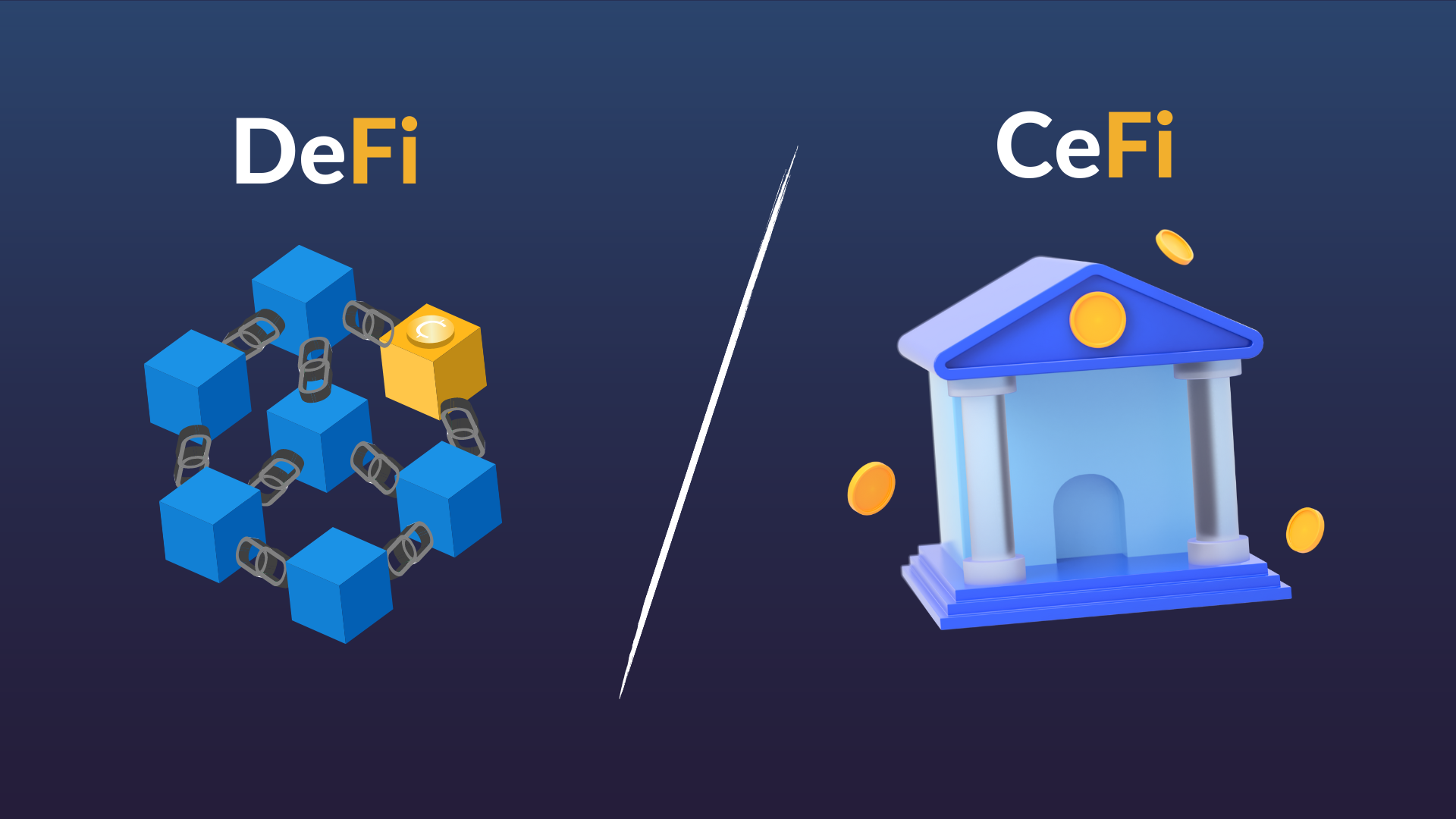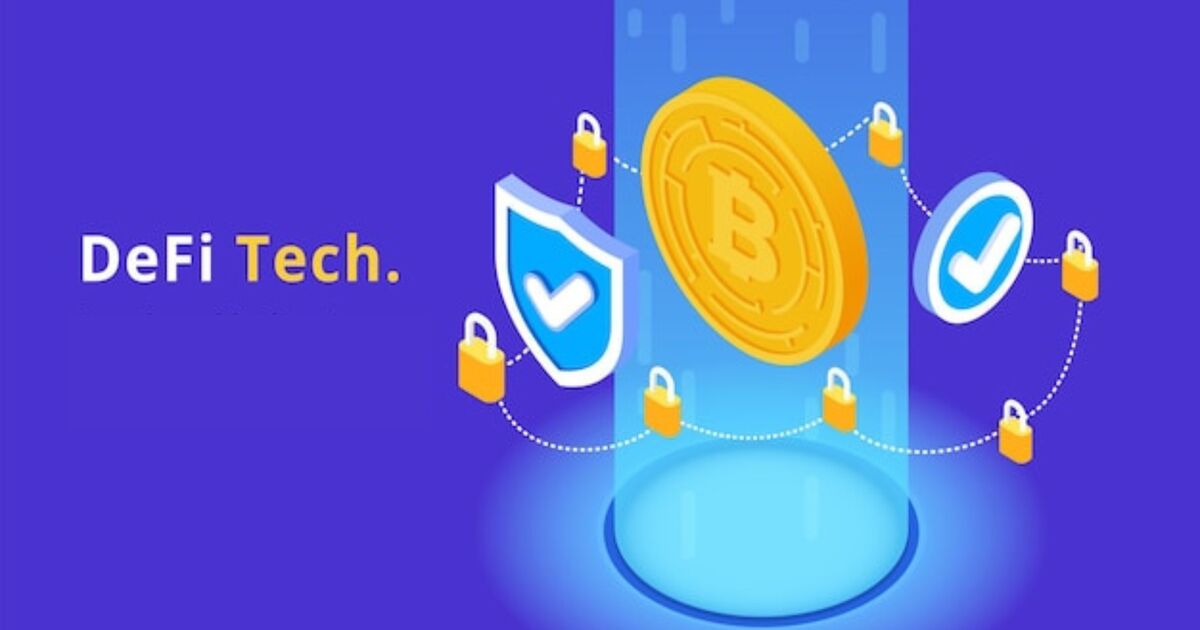As decentralized finance (Defi) grew, other services got in line for a prime shift. Through this blog, we’ll be shedding light on two trending technologies- DeFi and CeFi.
Table of Contents
What is Decentralized Finance (DeFi)?
DeFi, short for decentralized finance, is a blockchain finance solution. It does not rely heavily on central financial intermediaries to offer services. In addition, DeFi uses smart contracts on blockchain technology solutions.
Moreover, it is an automated code that runs entirely on blockchain. Hence, the blockchain processes transactions in a smart contract with no third-party intermediary.
The platforms in consideration of DeFi allow people to borrow or lend funds, trade cryptocurrencies and pay interest on funds. DeFi application revolves around the following functions;
- Firstly, Peer-to-peer lending and borrowing platforms,
- Secondly, Enabling decentralized exchanges,
- Thirdly, Tokenization and
- Lastly, Predict the market.
Real use cases of DeFi
Following are some of the real use cases of DeFi.
- Kyber: Kyber, as the name goes, is a trustable decentralized exchange.
- Totle: It works as an aggregator of decentralized liquidity with an automatic price optimization feature.
- Augur: Augur is a decentralized predictions market that can come in handy if you are using predictions to draw your investment.
What is Centralized Finance (CeFi)?
CeFi stands for centralized finance. It runs on centralized entities like a centralized crypto exchange. Additionally, the services under CeFi fall are meant to abide by the local authorities where they channel their operation.
These regulations are mandatory for centralized financial institutions like Know Your Customer (KYC) and anti-money laundering (AML) practices.
You will be surprised to know that cryptocurrency trading is one of the most common solutions. Here, centralized institutions keep your fund in custodial wallets.
Crypto wallets store consumers’ private keys safely. Along with this, CeFi offers their service to its consumers with particular services such as margin trading, lending, and borrowing.
Real use cases of CeFi
To understand CeFi better, you need to understand its real use cases. Some of them are listed below;
- Coinbase: Coinbase is a worthy cryptocurrency exchange that regulates quick trading, easy borrowing, native stablecoin, margin trading, continuous lending, safe and secure payments, and much more.
- Fairlay: Fairlay is a Bitcoin Prediction Market and Exchange that runs on the CeFi model.
- BlockFi: Again, it is a solid cryptocurrency and a lending platform.
- Celsius: Celsius is a smart cryptocurrency borrowing and lending payment platform that is safe to use.
DeFi vs. CeFi: What are the differences?
DeFi and CeFi are two different entities. So, to provide context, here are some basic yet significant differences between the two.
-
The Public verifiability factor
The DeFi application code is not open-source. The execution and bytecode of it can be verified on a blockchain technology solution and can be termed non-custodial DeFi. Therefore, unlike CeFi, DeFi users can easily observe and confirm the execution order of DeFi state changes, such as the transparency element.
-
Atomicity is not present in CeFi
A blockchain transaction permits back-to-back actions, which include different financial transactions. The entire process can be turned to atomic- concluding that the transaction can either be complete or fail.
-
Development and deployment process in DeFi
DeFi projects are developed and managed by a group of individuals. Even Bitcoin founders are unknown to them. Adding on, centralized finance provider users experience much less anonymity than DeFi transactions.
The miners regulate the DeFi smart contracts. When it comes to anonymous DeFi apps, they can function without the integration of a front end. Simultaneously, they push users to engage with the functionality of a smart contract.
-
DeFi comes with a custody
Compared to CeFi, DeFi permits consumers to have control of their assets at any time they wish. But we must remember that with great power comes massive responsibility. Users can absorb the abundance of technological hazards. So, centralized exchanges become significantly identical to traditional custodians.
-
Differences in transitioning costs
DeFi transaction and blockchain costs are crucial to avoid spam incidents. Because most of the capacity relies on anti-money laundering (AML) client verification. Thus, financial institutions in CeFI can opt for transaction services at no cost.
-
Non-stop market hours
CeFi market hours are famous for their unique experience of outages. The New York Stock Exchange and the Nasdaq Stock Exchange are two major trading venues in the United States. Moreover, to a big surprise, their working hours range between 9:30 am to 4:00 pm. But because of the non-stop nature of blockchain technology solutions, DeFi markets are open 24/7.
-
The value attached to the trust
When it comes to centralized finance, a user cannot trust the exchanges with asset apps. Therefore, you must instil trust in any authority with your assets.
Closing Thoughts
CeFi and DeFi offer similar concepts. But the approach is quite different. Therefore, the future is bright for both DeFi and CeFi.
You must consider the significance of blockchain technology solutions when it comes to different kinds of financial services. To incorporate these services, you can go ahead with an expert AI ML development company.
DISCLAIMER : This and other personal blog posts are not reviewed, monitored or endorsed by Blogjab. The content is solely the view of the author and Blogjab is not responsible for the authenticity of content of this post in any way. Our curated content which is handpicked by our editorial team may be viewed here.







